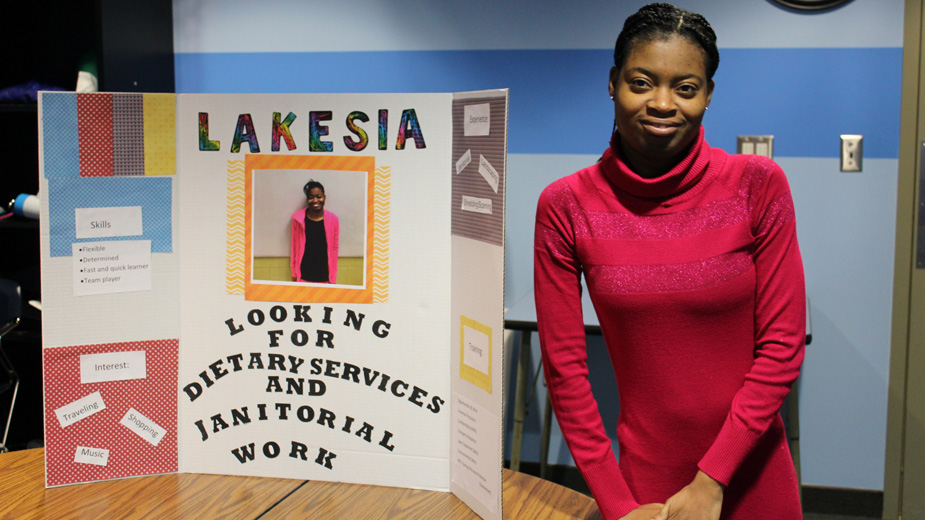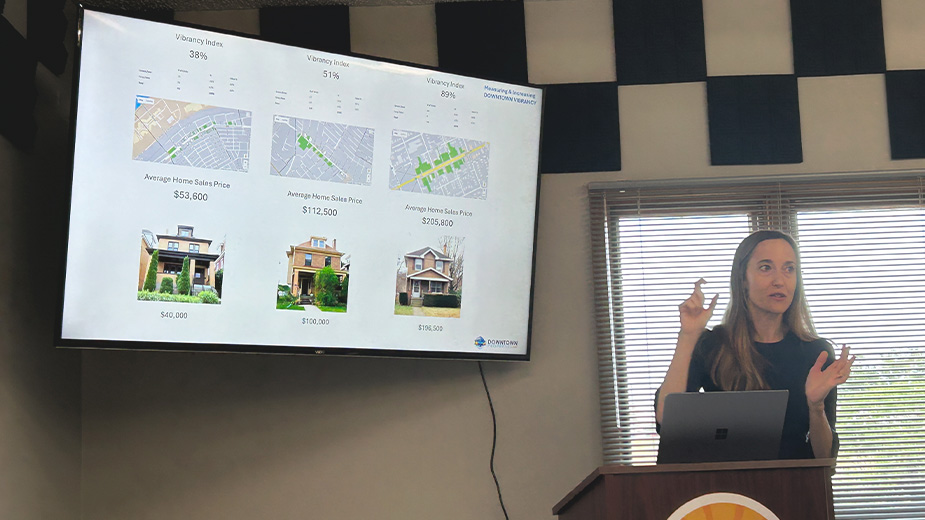Developmentally Disabled Workers Value Their Jobs
YOUNGSTOWN, Ohio – Almost every day, Michelle Mills shows up for work at That’s a Wrap Café. She clocks in for her six-hour shift and gets to work, just like the other dozen employees at the restaurant.
Every year, the restaurant bakes thousands of pepperoni rolls for local fundraisers. Mills is responsible for filling the dough with pepperoni and shredded cheese, putting the rolls on a baking sheet and puncturing the dough with a fork so they bake properly.
The only thing she is unable do is fold and roll them. A developmental disability prevents her from performing that function, but she is capable of doing everything else she’s assigned, Mills declares.
“I want to be a participant in the community and take away the stigma of people with disabilities,” she says. “[The other employees] are very, very accommodating. They’re really understanding. We laugh and just have a great time. There’s a good rapport.”
Over the course of a day, the staff prepares up to 6,000 rolls for delivery. With four or five people at a time putting the rolls together – the rest of the staff cuts dough, bakes the rolls or puts them in boxes – Mills sees her fair share of work.
“My station is a bit messier, as you can see,” she says with a laugh as she layers on cheese. “But I still like this and do a good job at it.”
Mills is one of the employees who has found work through the Mahoning County Board of Developmental Disabilities. Nearly four years ago, Gov. John Kasich signed an executive order that created the Employment First policy. Its goal is to establish employment as the top outcome for those with disabilities in Ohio.
Last July, the Mahoning County Board launched its work program and now works closely with some 30 businesses throughout the county to find work for its constituents.
“For anyone, it’s better to be a part of the community and getting out to meet peers that you normally wouldn’t be with if you were in a segregated workshop,” says Bill Whitacre, superintendent of the board. “It’s about life fulfillment and being part of the community.”
And, he notes, those who have the ability to work often jump at the opportunity.
Over the years, Lakesia Stanley has worked several jobs around the county. She’s scanned documents at township offices, shelved books at the library in the D.D. and Velma Davis Education & Visitor Center in Mill Creek Park, worked on a lawn crew and fed crickets at Big Cricket Farms.
“I want to get a job because I want to try different things. I want to do things I haven’t done before and get new skills,” she says. “I’m excited because I can have a chance to make more money at these jobs. But it’s not that much fun. It’s still a job. The paycheck is fun.”
Matthew Hynes, working as an aide at the board’s Centre @ Javit Court, has spent several months looking for a new place to work in a career exploration program.
“Sometimes I feel like a kid here. I want a grown-up job. I started in the office as a clerical aide and then I was moved out to the other aides,” he says. “I feel like I have more skills than what I’m doing here. And I want to be busy.”
Before Javit Court, Hynes worked in restaurants, delivered papers for The Vindicator and worked 12 years at a Goodwill store. He’s narrowed his job search to three areas: clerical work, a stocking position and a dietary aide.
“Matt doesn’t want to limit himself because he can do multiple jobs and he really wants a job,” says Kim Budaker, an economic development specialist with the Mahoning County Board. “And he’s done some research on his own to see what’s available and what would match up with him.”
On Feb. 5, the board and several other public and private agencies hosted a reverse job fair where a dozen employers met with disabled jobseekers, including Hynes and Stanley. To get the attention of businesses, potential employees made boards on which they outlined their work experience, the fields in which they’re interested and their personal activities.
“At a typical job fair, they may feel intimidated by going to each and every employer and give their pitch on what they’re capable of,” Whitacre says. “Here, people can approach them because they’re interested in what they see.”
Those who have worked with other disabled job seekers have seen similar persistence and enthusiasm on the job. Last summer, Stanley worked with a lawn crew the entire season and was one of the few to work that stretch without leaving.
“She will make sure that a job gets done. The lawn crew was a great proving ground for that,” says Lynn Seekford, a habilitation coordinator with the board. “Lakesia stuck through it. She is small but mighty. She didn’t always enjoy the work, but she did it and it got her a great reference.”
Mills’ boss, the owner of That’s a Wrap, Steven Lynch, has seen similar performance from both of his disabled employees.
“They are reliable. They like to work. Sometimes they want to work longer. You can really tell that they just appreciate having a job. That pays off as an employer,” he says. “As long as they can do the job, I don’t care about the speed. I just want them to feel comfortable.”
Before placing someone in a job, Budaker and others at the board visit the business interested in hiring someone with a disability. They tour the site and discuss the job requirements, such as duties and a schedule. When an employee starts, he has a job coach who works with him until he’s comfortable in the job and its demands.
Among the first businesses to hire someone through the employment program is Plaza Donuts. Owner Michael Froomkin hired a janitor last July, shortly after the program started, and has seen positive results.
“In terms of business, it doesn’t help us out, but it’s good for people to see him there and that we’re hiring someone who can’t go out on their own,” he says. “It’s a good feeling knowing that you’re helping others who need help.”
Lynch does note that disabled employees can’t do every job at the restaurant, but says his business model has changed over the years and opened more opportunities.
“When I was still working with a café style of business, it would have been very difficult because it’s specialized with counter service and making so many different items,” he explains. “Now it’s more of an assembly line job. There, you can put them in positions that they couldn’t have been in before.”
At present, there’s no financial incentive for businesses to hire people with disabilities, Budaker and Whitacre say, beyond the standard tax credits for hiring, worth up to $2,400. But that isn’t slowing the trend across the state or country.
“This is not unique to Mahoning County. People are realizing that people with developmental disorders have a lot to offer society and there’s a benefit to both sides,” Whitacre says.
According to the Employment First website, every dollar spent on “disability-related accommodations” can save upward of $34 in training or recruitment expense. In addition, people with disabilities have a 48% lower turnover rate and 90% perform equal to or better than fully able employees.
The site also notes that 92% of Americans view companies more favorably that hire employees with a disability than those who don’t and 87% say they’re more likely to patronize businesses that hire disabled workers.
There’s also a community-building aspect to hiring those with disabilities, Whitacre notes.
“If someone walks into That’s a Wrap and sees Michelle working, they’ll see that she has some physical limitations. But they’ll also see that she’s working alongside everyone else at a local business,” he says. “That visual shows that someone can be included in our community even if they have a developmental disability. It helps break the stigma.”
Six months into having someone with a disability work in their stores, the two business owners say the investment has been worth it, noting that it’s a practice they feel other businesses should look into. Not every industry can hire those with disabilities, Lynch concedes, but those who can, such as restaurants or stores that need people to fill stocking positions, should consider it.
“I don’t think I’d hire a waitress because it’s more involved with directly talking to customers and handling money and working quickly with crowds,” Plaza Donuts’ Froomkin says. “But something like a janitorial position, definitely.”
And for the workers, having a job and all that it brings – a paycheck, something to do during the day and a sense of independence – is worth pursuing.
“I know someone who doesn’t have a job and I just think, ‘What do you do all day?’ You’re just sitting around the house all day. Who wants to do that?” Hynes asks. “It’s good to be interacting with people. It feels rewarding.”
Pictured: Lakesia Stanley displays her skills and ambitions at a reverse job fair for workers with developmental disabilities.
WATCH VIDEO:
Ready, Willing and Able
Copyright 2024 The Business Journal, Youngstown, Ohio.



